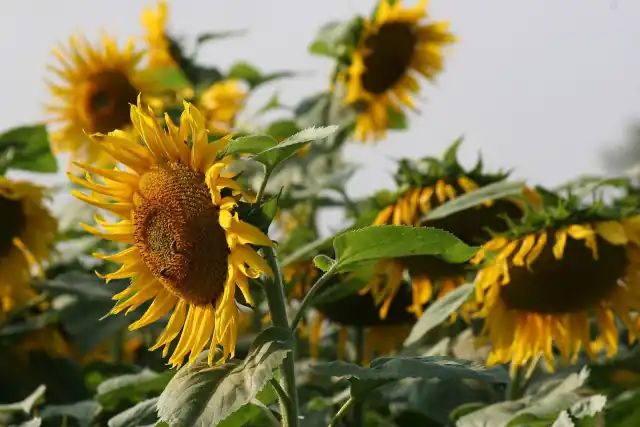
Yambol, Bulgaria — An extended period of drought and scorching temperatures is expected to halve Bulgaria’s sunflower and corn yields this year, leaving farmers in dire straits and calling for government intervention.
In the Yambol region, the situation is especially alarming as sunflower harvesting began nearly a month earlier than usual, with yields plummeting to between 50-60 kilograms per hectare—barely half of the typical harvest. Only a few farmers have managed to achieve yields as high as 100 kilograms per hectare.
The harsh weather conditions have been unrelenting. With temperatures soaring to around 40 degrees Celsius, the summer heat has taken a severe toll on crop pollination and development, according to Stoyan Alexandrov, chairman of the National Association of Grain Producers for the Yambol region.
Alexandrov explained that the intense heat, combined with hot winds, has left sunflower pods underdeveloped, typically measuring only 10-15 centimeters in diameter. The quality of the crops has also suffered, with diminished oil content in the seeds.
“The summer heat has been brutal. We’ve seen entire fields where the sunflowers just couldn’t develop properly,” Alexandrov said. “The wind and high temperatures have practically scorched them, leaving us with yields that are a fraction of what we’re used to.”
This troubling scenario is not unique to Yambol. The drought has similarly affected South and South-Eastern Bulgaria, including regions such as Plovdiv, Haskovo, and Stara Zagora. Farmers in these areas are reporting similar struggles as crop conditions continue to deteriorate.
In Dobrudzha, Bulgaria’s agricultural heartland, the situation is just as bleak. Farmers in the region, known for its fertile soil and high productivity, are also preparing for an earlier-than-usual harvest of sunflower and corn.
Nedyalko Statev, a farmer who cultivates 8,000 decares of land in Pop Grigorovo, shared his concerns about the significant drop in yields. He noted that the last substantial rainfall in the region occurred at the end of June, with temperatures now exacerbating the drought conditions.
“The drought is hitting us hard. I expect to harvest only half of the usual amount this year,” Statev said. “For corn, I’m estimating around 300 kilograms per hectare, and for sunflower, about 150 kilograms. Under normal conditions, we’d be harvesting 700 to 750 kilograms of corn and 280 to 300 kilograms of sunflower.”
Experts are sounding the alarm on the long-term impact of this weather pattern. Associate Professor Galin Georgiev from the Dobrudzhan Agricultural Institute explained that while hot spells are not uncommon in Bulgaria, the current prolonged heat waves, with temperatures consistently above 34-35 degrees Celsius, coupled with minimal rainfall, are devastating for crops.
“Corn is particularly vulnerable to these conditions,” Georgiev said. “We’re witnessing the consequences of these extreme temperatures and the lack of precipitation firsthand. The crops simply cannot survive in these conditions.”
The ongoing drought has sparked urgent calls for action from Bulgaria’s farming community. Farmers are appealing to the Ministry of Agriculture to implement immediate measures to support irrigation efforts and ensure food security in the country.
Alexandrov, the National Association of Grain Producers chairman, suggested that the state take control of the country’s irrigation infrastructure to improve water usage and support farmers during drought conditions.
“Irrigation in Bulgaria is currently managed like a commercial business, which doesn’t work for us,” Alexandrov stated. “Water is being sent to Greece and Turkey, while we are suffering from drought. The Ministry of Agriculture should step in and take over the management of the irrigation systems so that we can prioritize our crops.”
The drought has also sparked a broader conversation about the need for improved irrigation infrastructure across Bulgaria. Farmers argue that without state intervention and support, the current systems are inadequate for addressing the challenges posed by climate change.
“The government must act now,” Statev urged. “If we don’t get help with irrigation, we will continue to see these disastrous harvests year after year. We need a long-term solution, not just short-term relief.”
Despite the grim outlook for sunflower and corn crops, there is one silver lining in Bulgaria’s agricultural sector: the wheat harvest. This year, wheat yields have been more favorable, surpassing last year’s harvest.
The average yield for wheat stands at 570 kilograms per hectare, an improvement over the 547 kilograms per hectare recorded in 2023. This has led to a slight increase in total wheat production, which is expected to reach approximately 6.4 million tons—a 3.4% rise from last year.
However, even this positive development comes with a caveat. The increased wheat production has not offset the rising costs faced by grain producers, and despite the better yields, the buying prices for wheat have continued to decline.
The summer buying campaign began with wheat being purchased at 360 leva per ton—12% lower than the average annual price. As of now, the purchase price has dropped even further, with wheat currently being sold at around 320 leva per ton.
Farmers are finding themselves in a difficult position. While the wheat harvest may have brought a temporary reprieve, the overall financial pressures remain high. The costs of production continue to rise, and the lower market prices for wheat add to the challenges that farmers are already facing due to the poor yields of other crops.
“The better wheat harvest is a bit of a relief, but it’s not enough to make up for everything else,” Alexandrov said. “We’re still struggling with rising costs and lower prices. It’s going to be a tough year for us.”
As Bulgaria’s farmers face these compounding challenges, the future of the country’s agriculture sector remains uncertain. Without immediate intervention from the government and long-term solutions to address climate change and improve irrigation infrastructure, the outlook for future harvests could be increasingly bleak.
“We need help now more than ever,” Statev concluded. “Our livelihoods depend on it, and so does Bulgaria’s food security.”
